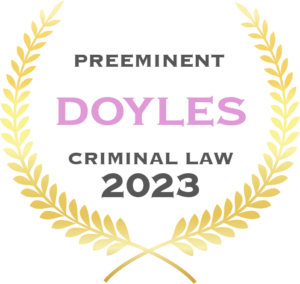The High Court of Australia has upheld the validity of Crime Prevention Orders, despite the appeal of three alleged members of an outlaw motorcycle club.
These individuals contested the orders, which imposed strict restrictions on their movement and associations, arguing that they encroached upon the integrity of the courts as outlined in the Constitution. Nevertheless, the High Court ruled that the orders are constitutionally sound.
What is a Serious Crime Prevention Order?
In 2016, the Serious Crime Prevention Orders Act was enacted, targeting individuals engaged in activities related to serious crime. Under this law, the Court can issue a Serious Crime Prevention Order (SCPO) against someone if it’s determined that:
- The person has been convicted of a serious offence, or
- The person was involved in serious crime-related activity, even if they haven’t been convicted of a serious criminal offence (due to acquittal or lack of charges), and
- There are reasonable grounds to believe that issuing the order would safeguard the public by preventing, restricting, or disrupting the individual’s involvement in serious crime-related activities.
What is a Serious Crime?
The Criminal Assets Recovery Act defines a “serious offence” to encompass various activities such as:- Supplying, cultivating, or trafficking prohibited drugs
- Serious theft, fraud, money laundering, extortion, violence, bribery, or corruption
- Offences like harbouring criminals, blackmail, obtaining or offering secret commissions, perverting the course of justice, tax or revenue evasion, illegal gambling, or forgery
- Homicide
- Some firearm offences
- Sexual servitude or child abuse offences
- Participation in criminal groups
- Destroying or damaging goods valued at over $500
- Attempting, conspiring, inciting, or aiding or abetting any of these offences.
Additionally, a “serious crime-related activity” covers any actions by a person that would qualify as one of these offences, regardless of whether they’ve been tried, acquitted, or had a conviction overturned.
What Orders Can be Made in a SCPO?
An SCPO (Serious Crime Prevention Order) can include various prohibitions, restrictions, or requirements deemed necessary by the court to safeguard the public from the individual’s involvement in serious crime-related activities. However, the court is prohibited from mandating that the person divulge information protected by client legal privilege or confidential information.
Any information compelled to be disclosed under the SCPO cannot be used against the person in either civil or criminal proceedings.
An SCPO can last for a maximum of five years. The penalty for violating such an order is a fine of up to $33,000 or imprisonment for up to five years, or both.
The 2018 High Court Case
On October 5, 2018, NSW Police Commissioner Mick Fuller requested the Supreme Court to apply a Serious Crime Prevention Order (SCPO) to Damien Charles Vella, Johnny Lee Vella, and Michael Fetui.
These men were alleged to be members of outlaw motorcycle clubs, with the Commissioner claiming they had been convicted of serious criminal offences and were involved in other serious criminal activities without conviction.
The Commissioner believed that implementing an SCPO would protect the public by preventing, restricting, or disrupting the involvement of each plaintiff in serious crime-related activities.
The SCPO, lasting two years, imposed several restrictions on the men, including:
- Prohibition from associating with motorcycle club members
- Ban on attending motorcycle club-associated premises
- Restriction on travelling in a vehicle between 9:00 pm and 6:00 am, except for medical emergencies
- Limitation to possessing only one mobile phone
- Prohibition from possessing any weapons
- Ban on wearing outlaw motorcycle club insignia
The men appealed against the SCPO’s imposition to the High Court, arguing that the SCPO Act itself was invalid as it contradicted Ch III of the Constitution and undermined court integrity. They invoked the Kable Principle, asserting that the SCPO Act intruded impermissibly into court processes and decisions.
However, the High Court ruled that the SCPO Act was valid and did not violate the Kable principle. It stated that Courts issuing SCP Orders retain substantial judicial discretion and aren’t acting at the government’s command.
The SCPO Act merely outlines broad principles for courts to apply, rather than dictating their actions. Before imposing an order, the court must consider various factors, including the likelihood of the person being involved in serious crime-related activities, whether the order would prevent or disrupt such activities, and whether it’s appropriate for public protection.
According to the High Court, these powers should be exercised by the courts themselves.
Key Takeaways
- The High Court upheld the validity of Serious Crime Prevention Orders (SCPOs) in Australia, against a challenge by alleged outlaw motorcycle club members.
- SCPOs can be issued if a person is convicted of a serious offense or involved in serious crime-related activity, aiming to protect the public by preventing involvement in such activities.
- Orders can include various restrictions and are valid for up to 5 years, with breaches potentially leading to fines or imprisonment.
- The High Court's decision confirmed that SCPOs do not infringe constitutional principles, allowing courts substantial judicial discretion in their application.
Written By

James Janke
James Janke is founding partner at Hamilton Janke Lawyers, and has more then decade of experience as a Criminal Defence Lawyer. Admitted to both the Supreme Court of New South Wales and High Court of Australia



